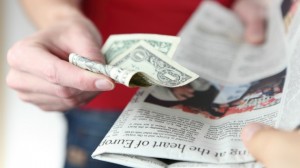
When the email from The Washington Post landed in my inbox announcing Jeff Bezos’ acquisition of the venerable institution, my first instinct was to examine it for signs of spam. It’s that unusual to be that surprised by news these days.
The acquisition makes a great deal of sense for many reasons that have been discussed at length elsewhere. Bezos has expertise in digital content, paywalls, delivery, mobile, local, advertising – all the problems and conundrums that face The Washington Post, as well as every other legacy print newspaper. He’ll innovate and hopefully help the paper find its way to solvency.
What few have pointed out is that Bezos’ acquisition of the Post is very much a case of history repeating itself. The paper came into the hands of the Graham family in 1933 when Eugene Meyer, the family patriarch and former Federal Reserve chairman, acquired the paper in a bankruptcy auction. Meyer spent millions of his personal fortune keeping the paper in business. Like Bezos, who will be under continual pressure to demonstrate he’s not using the paper as a pulpit to further Amazon’s many interests on issues such as sales taxes, competitive pricing, hiring practices and a litany of other issues, Meyer too was pressured to distance himself from the appearance of using his ownership of the paper to further Republican agendas.
Like Meyer before him, Bezos is in a long, long line of wealthy, successful businessmen who buy themselves a newspaper. Just a few days before Bezos snapped up the Washington Post, John Henry, principal owner of the Boston Red Sox, acquired the Boston Globe. Last year, Aaron Kushner’s 2100 Trust acquired the Orange County Register. A group of local businessmen including former New Jersey Nets owner Lewis Katz bought the Philadelphia Inquirer and Daily News. Billionaire Philip Anschutz picked up the Gazette in Colorado Springs, and real estate developer Doug Manchester bought the San Diego Union-Tribune. Then there’s Sam Zell and the Tribune Company (which includes the Los Angeles Times) and Warren Buffet, who has acquired over 30 dailies in recent years.
Rich, successful businessmen buy newspapers. But Bezos is the first instance of a rich, successful technology businessman buying a newspaper. Not a banker, sports team owner, private equity investor or real estate tycoon, but someone who made his fortune in digital.
The acquisition of a prestigious media property is high profile. There’s a philanthropic aspect to keeping a venerable institution like WaPo afloat, but it’s a trophy acquisition, too, something that can’t possibly be lost on Bezos. That a Bezos can buy a WaPo means that a similar acquisition by, say, a Schmidt or a Gates or a Brin or an Ellison is hypothetically not far behind. We may be entering an era of the technology media mogul – a new era of digital maturity in which the equation wouldn’t be AOL buying Time Warner, as was the case in 2000, but Steve Case buying Time Warner had this marriage occurred today.
Please read the rest of this post on iMediaConnection, where it originally published.
